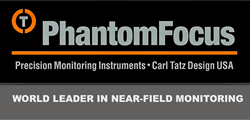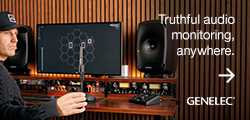Audio Precision has updated its APx500 audio measurement software to v7.0. In parallel with this release, the company is also introducing APx500 software subscriptions, offering APx users an alternative to licensing software.
To provide greater flexibility in access to APx500 measurement software, Audio Precision is introducing software subscriptions as an alternative to perpetual software licenses. While a perpetual software license – which grants a permanent, non-exclusive and non-expiring right to use the software – will still ship with each new analyser, software subscriptions provide another path for existing APx users to access the latest software release and associated enhancements. Such subscriptions grant a time-limited licence to use the software and provide access to all versions and all options (excluding PESQ and POLQA). When the subscription expires, the analyser reverts to the software version and options for which it was previously licensed.
 For users and organisations that prefer to retain perpetual licenses, software upgrades (SW-UPG), software maintenance (SW-MAINT) and extensions (SW-EXT, sold with new analysers only) remain available, but only include software options purchased for a given analyser. New hardware-based analysers are sold with a perpetual licence, however APx500 Flex can be purchased with either a perpetual licence or a subscription.
For users and organisations that prefer to retain perpetual licenses, software upgrades (SW-UPG), software maintenance (SW-MAINT) and extensions (SW-EXT, sold with new analysers only) remain available, but only include software options purchased for a given analyser. New hardware-based analysers are sold with a perpetual licence, however APx500 Flex can be purchased with either a perpetual licence or a subscription.
Developed by GRAS Sound & Vibration, SysCheck2 is designed to actively verify whether the sensitivity of a microphone has drifted since its last calibration. This capability is being introduced with two new 0.5-inch microphone sets: The 246AE pre-polarised free-field microphone, and the 246AO pre-polarised pressure field microphone.
In the first collaborative effort by the GRAS and Audio Precision engineering teams, APx500 release v7.0 enables an APx user, in conjunction with an APx517B, APx1701, or GRAS 12Bx power module, to run SysCheck2 and receive a pass/fail indication for each connected SysCheck2-capable microphone, without the need for a calibrator or physical access to the microphone. From a microphone in production test fixture to an array of microphones in an anechoic chamber, the combination of SysCheck2 and APx allows the user to verify the accuracy of the entire signal chain without physical access or potential disruption of the test set-up.
Earlier this year, Audio Precision introduced the Fast Sweep signal, an extremely fast stepped frequency sweep that provides several advantages (eg. the ability to sweep from low-to-high or high-to-low frequency) in comparison to a logarithmically-swept sine (chirp) signal. With release 7.0, APx software now enables the use of Fast Sweep in open loop testing scenarios, such as the testing of smart speakers. Fast Sweep is the primary stimulus signal used when using either High Order Harmonic Distortion (HOHD) or Rub & Buzz Loudness measurements.
Suited to those performing spectrum analysis, v7.0 brings several improvements to the Fast Fourier Transform (FFT) analysis capabilities of APx software: Arbitrary lengths, windowless analysis, and level triggering. By allowing arbitrary FFT/DFT (Discrete Fourier Transform) lengths, users can now always find a combination of transform buffer and sample rate to arrive at convenient frequency resolution. With windowless analysis, engineers can perform synchronous, windowless FFT analysis on non-synchronous signals.
Users who prefer Bench Mode or performing real-time adjustments on the devices under test (DUTs), will benefit from the Transfer Function in Bench Mode. In v7.0, Bench Mode-orientated customers have access to the Transfer Function measurement, and the complex frequency response function for a device, including the magnitude and phase (or real and imaginary components), using any broadband signal (speech, music or noise).
‘As a measurement platform, APx500 software is incredibly versatile and powerful. It is a platform we’re committed to continually enhancing,’ says Audio Precision General Manager, Daniel Knighten. ‘The release of v7.0 is the latest demonstration of that commitment, as is the introduction of APx subscriptions which provide greater choice to users in how to access the versions that best suit their measurement needs.’
New APx audio analysers will begin shipping with v7.0 software in December. Each new analyser includes one year of software maintenance, effectively licensing that instrument for APx v8.0 when it is released (as well as any minor 7.x releases that occur prior to v8.0). Release v7.0 is available now for download.
Release 7.0 is compatible with all analysers in the APx500 Series. An APx KeyBox is required to run v7.0 on Legacy APx analyzers. APx KeyBoxes already installed on Legacy analysers are compatible with v7.0 and only require an updated licence file once an upgrade is purchased (unless they are pre-licensed for v7.0 via an existing software maintenance contract, for example SW-MAINT-3).
More: www.ap.com









